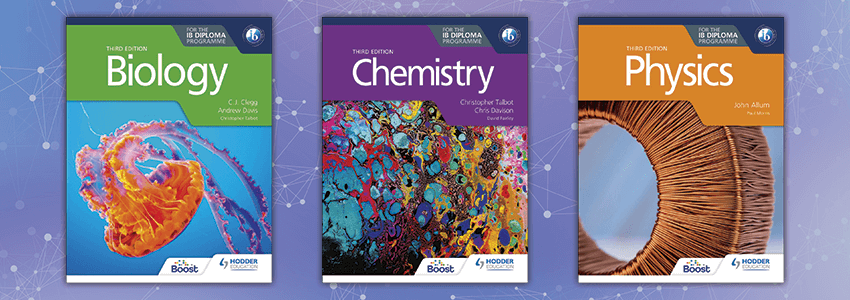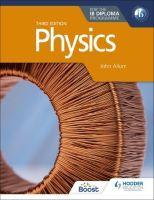

BLOGS > JANUARY 31, 2023
BY JOHN ALLUM

Trust experienced and best-selling authors to navigate the new syllabuses confidently with these coursebooks that implement inquiry-based and conceptually-focused teaching and learning.
Developed in cooperation with the International Baccalaureate (IB)

The new IB Physics Guide is much more diverse than previously, providing students and teachers with many opportunities for variety, expanding beyond the limitations of just pure physics. Many more changes were needed for this new edition, compared with the last revision, and it has taken more than 18 months to produce. The principal aim has been to provide greater interest and variety into the course and the book, stressing cross-topic links, common themes and a greater variety of learning techniques. Theory of Knowledge (TOK) and Nature of Science (NoS) have retained their rightful prominence. However, amid all the variety, I believe that it is of vital importance that students can readily identify the most important knowledge that they need to take with them into the examination room. This has been achieved through the use of the prominent Key Information feature, to be found, where it is relevant, on most pages throughout the book.
The removal of the options and some of the more challenging concepts will disappoint some, but has surely made the course more manageable and accessible.
The book is necessarily a very close match to the IB Physics Guide. This is highlighted by the quotes from the syllabus and the data booklet found throughout. In writing the book, I needed to be constantly aware that the syllabus order (and the order of the book) is not necessarily the same as the teaching order. However, the book is written in such a way that there is a logical progression of ideas, so that it can be the teaching order, if required.
Students taking the course have a very wide range of competence in English language, and also in their prior knowledge of physics. Learning terminology is certainly an essential part of any science course but, wherever possible, complex English has been avoided. Physics examples have been taken from around the world.
The online glossary is longer and more detailed than might be normally expected, and it is intended not only as a source of reference, but also as a revision aid.
The coursebook needs to be suitable for students starting the IB course with different levels of physics knowledge, including some for whom this is their first course in the subject. Topics start from first principles and make few, if any, assumptions about the physics backgrounds of the readers. However, at the same time, introductory topics are treated quickly and should provide reassuring support for those who have studied the basics of physics before.
I know from many years of experience as an IB examiner that the level of mathematics required in the IB physics examination is not usually a problem for most students. However, the use of mathematics only becomes relevant after the student has identified and applied the relevant physics. So, students need plenty of practice at answering questions (including those which require qualitative answers). Hence, the very large number of worked examples and self-assessment questions which are a significant feature of the book. Preparing these has been a major task in the preparation of the book, so, I very much hope that these will be a valuable resource for students and teachers.
The required integration of tools and inquiry process into the book has provided challenges because, if each point was to be introduced where it first becomes relevant, the early chapters would be overloaded, whereas the later chapters would have very few, but I think we have the balance right. I hope you like these new features.

John Allum
John Allum taught physics to pre-university level students in international schools for more than 30 years (as a head of department). He has now retired from teaching, but lives a busy life in a mountainside village in Southeast Asia. He has also been an IB examiner for many years.

An Author Interview with Drew Daywalt
June 27, 2025
Drew Daywalt, award-winning author of the best-selling The Day the Crayons Quit series, is about to release his second middle grade book with illustrator Mike Lowery, No Sam! and the Meow of Deception. The title continues the hilarious adventures of Sam...
Read more
An Author Interview with Adam Wallenta and Makana Wallenta
June 27, 2025
Get ready to rock the galaxy with the first volume of Punk Taco – a wildly imaginative, music-fueled sci-fi adventure from father-son duo Adam and Makana Wallenta. Created when Makana was just five years old, this award-winning graphic novel now debuts...
Read more
An Author Interview with Lisa Manuzak Wiley
June 27, 2025
A bewitching new graphic novel series is arriving this fall!Author-illustrator Lisa Manuzak Wiley, who grew up in Hawaii, blends cozy fantasy, sisterhood, and tropical charm in a heartfelt homage to her roots: The Witches of Pepperwood Bay Vol. 1. Lisa...
Read more
What We're Reading – Books to Add to Your TBR List
June 4, 2025
As a Follett Content Outside Sales Consultant, I’m not only an avid reader, but also a passionate book reviewer! I’ve curated my top 10 book picks that are perfect for adding to your To Be Read (TBR) list. These titles...
Read more
Author Joseph Koszary on the Changes Made to the International Baccalaureate Extended Essay
May 22, 2025
As someone who’s served as an extended essay coordinator, examiner, and supervisor, I’ve grown deeply familiar with the previous incarnation of the extended essay (EE). Like many of you, years of accumulated experience have made supporting students through the process...
Read more
Celebrate Literacy All Year Long: Host an Online Book eFair!
May 12, 2025
Reading and literacy are essential parts of our lives, and there are numerous events throughout the year dedicated to celebrating and promoting these important skills. Hosting a Follett Book eFair is a fantastic way to engage your school community, share the...
Read more